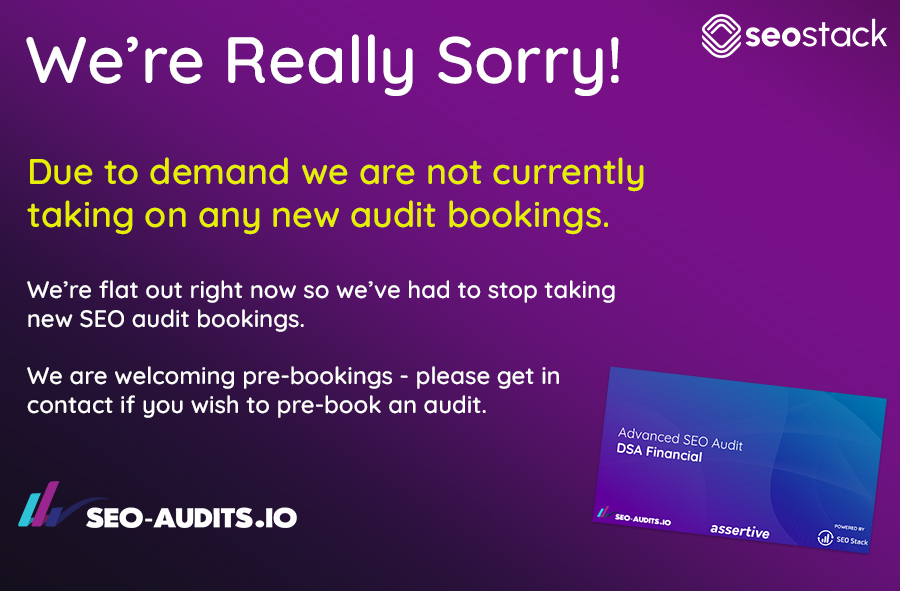Google Deindexing Websites After Manual Action for Thin Content
We’ve seen a sudden spate of manual actions for businesses whom had SEO that lead to lots of thin pages being created as part of a location strategy. This has seen entire websites being deindexed because of “thin” content.
Posted by Daniel Foley Carter
Google Deindexed An Entire Website Over “thin content”
Recently whilst auditing a number of different websites we’ve started to see Google taking harsher action against websites that have lots of thin pages predominantly those that utilize location pages.
In the last few weeks we’ve had a number of clients booking audits because they’ve seen a substantial and total loss of traffic to their website. On first analysis checking in Google Search console under manual actions we started to see a spate of manual actions around thin content which saw the entire website affected and not just the pages that were classed as having thin content.
Typically in the past if a website had thin content that was considered spammy Google would just de-index or de-list those pages but now we’re starting to see Google take much harsher action by removing the entire website from the index – this looks more punishable than anything.
In one such example if you took 100% of the websites index around 60% of the index would be classed as thin content because of the word counts on the pages (typically 500 or less words) in this example we saw how 60% of the thin content resulted in the entire website being removed from Google’s index.

Manual Actions: 1 Issue Detected
I’d say “issue” is an understatement – especially when we look at the fact that it affects ALL PAGES – that’s right! ALL pages.
To reiterate – 60% of the websites index was LOCATION page based – the other 40% was service/auxiliary driven.
So, based on the “thin content with little or no added value” warning – we would expect this to JUST affect those pages – well, it didn’t.
The WHOLE website was deindexed.
Thin content with little or no added value
Here we see: “This site appears to contain a significant percentage of low-quality or shallow pages that do not provide users with much added value (such as thin affiliate pages, cookie-cutter sites, doorway pages, automatically generated content or copied content). Learn more“
This is interesting – because, how is Google determining that a “thin content page” is of low value?
I mean – not all thin pages are of no value – i.e. you can have lots of PRODUCT CATEGORY pages with variant URLS and a single product – doesn’t make them low value?

Suffered a Manual Action?
If you’ve suffered from a manual action from Google and require help to have your index / website and rankings restored – here at SEO Audits IO we specialise in auditing and rank / index recovery, manual action removal and more.

Content That LOOKS Like It’s There for SEO and NOT For End Users
With this client – the issue was based on location pages – LOTS of location pages. The location pages were clean and useful for end users in respect that they showed WHAT was on offer in that location – and, the pages DID meet end user needs.
However – it’s the MICRO TARGETING that’s made the website look suspicious to a quality rater who’s clearly reviewed the location pages and deemed the APPROACH to be spammy.
The pages MET end user intent – they were however, thin on content and repetitive – based on location the only content that was unique was a description of the micro location.
Creating Lots of Thin Pages for SEO Benefit
For the last 10+ years – we’ve seen so many sites focus on a location strategy – creating hundreds, sometimes THOUSANDS of pages to cover micro locations down to areas within a town – appending a post code to try and capitalise further.
This is something that – for many businesses has worked – however, logically – this is NOT something that was ever good in respect of “best practice” – but, up until recently, it was almost unheard of to see a website DEINDEXED entirely for a thin content manual action – typically, Google just wouldn’t index the content (it would end up in crawled currently not indexed / discovered currently not indexed).
However NOW – it looks like Google is dropping the hammer on such strategies.

Video Transcription:
Hi, my name is Daniel Foley Carter and I have started to notice recently sites, and this isn’t the first site that I’ve been auditing, recently that has literally been completely removed from Google’s index because of location pages. So what I’ve done, is I’ve, obviously, I’ve taken out who the client is, um, but we can.
Very clearly, a sudden drop and dropout. Now, it, it’s really interesting because it shows, click data, even though the site has been completely removed completely, the indexed. So when we look at manual actions, we see the warning for thin content with little or no added value. The site appears to contain a significant percentage of low quality or shallow pages that do not provide users with much added value, such as thin affiliate pages, cookie cutter, site doorway pages, etc.
[00:01:00] I get the feeling that Google’s actually going to consider these doorway pages because you can’t really class them as anything else. And what’s interesting here is that these doorway pages, they accounted for around 40, I think, around, uh, no, it was 60% of the index was, thin location pages, and the other 40% was service pages, auxiliary pages and whatnot.
But we can see here how this affects all pages. So 60% of the index has affected 100% of the website. Now, to give you an indication, Here. Um, effectively we had loads and loads of these, uh, location pages, but for the location pages, it was predominantly location, uh, region. Then it was location, uh, area.
Then it was location, region, area, and postcode. So [00:02:00] what they’ve done is, Just bulk created loads and loads of these, uh, thin location pages, which really didn’t have hardly any content in. What they were doing was adjusting the con content slightly so that they would have the same service, but they would just write a little bit about the location.
But it was very thin. It was like a hundred words, 200 words, but they were generating traffic from it. So it was working for a little while up until recently. Now the whole site has been the. Um, and obvi subsequently, it’s part of the audit. Uh, I’ve told them to bin off all of the location pages before we submit a reconsideration request.
So very interesting to see.

































